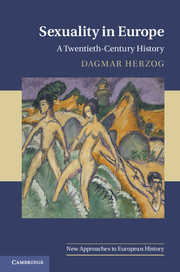Introduction
Published online by Cambridge University Press: 05 June 2012
Summary
The twentieth century is often called “the century of sex” and it is frequently understood as a time of increasing liberalization of sexual mores and attitudes. It is understandable that many retrospective observers look at the twentieth century in this way, and for a variety of reasons. These include: the growing perfectibility and availability of contraceptives; the advancement of homosexual rights; the greater acceptance of premarital sex as well as burgeoning importance ascribed to sex in marriage; and the more generally growing celebration of sexual pleasure – along with the ever more pervasive stimulation of desire in advertising and pornography as well as the exploding profusion of advice for intensifying partnered sex. Further evidence could be found in the relaxation of church teachings on sex, especially from the 1930s to the 1960s (and certainly in the increasing popular disregard for church teachings over the course of the entire century), or in the growing sensitivity to the need to combat sexual violence and coercion and greater appreciation for female sexual self-determination advanced by the women's movements of the 1970s to 1990s.
- Type
- Chapter
- Information
- Sexuality in EuropeA Twentieth-Century History, pp. 1 - 5Publisher: Cambridge University PressPrint publication year: 2011
- 1
- Cited by



